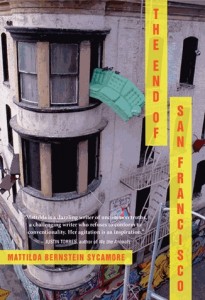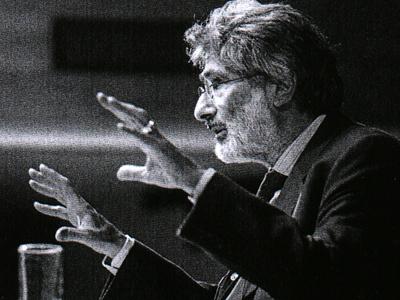The End of San Francisco
 The End of San Francisco
The End of San Francisco
By Mattilda Bernstein Sycamore
City Lights, March 2013
192 pages / $15.95 Buy from City Lights or Amazon
When I left Seattle and went to grad school in Los Angeles at the end of the 1990’s, I read Benedict Anderson’s Imagined Communities and it changed my life. It gave me a framework to understand the searing misunderstandings going on in the feminist self-defense collective I had been pouring my heart and soul into since we came together in response to the rape and murder of our friend Mia Zapata. Some of us in the collective became best friends while others of us could barely speak to each other without spitting. Sisterhood was powerful but it was also alienating. Any unified identity as a community, the word we used to describe who we were and who we felt accountable to, was absolutely imagined.
Benedict Anderson’s Imagined Communities is kind of an odd place to start a review of Mattilda Bernstein Sycamore’s new book, The End of San Francisco, since she is an antidote to rather than perpetrator of sterile inaccessible academic writing. But The End of San Francisco is as much social critique about the impossibility of collective dreams as it is a memoir looking back at queer and feminist community building in the ‘90’s. And it feels life changing reading this book in the midst of the marriage debates.
The book moves in and out of time and geography, traveling in a non-linear journey across several U.S. cities including Seattle and, of course, San Francisco. This journey is a timely reminder that creating a queer family once meant we were running away from the families that rejected us, that broke our hearts, sometime our bones, and often our will to live. It’s a story for all of us who ran as far as we could to find the other freaks searching for new ways of being family and being in relationships that were more than our parents’ misery. This is a story about those of us who gave a shit about health care, survival and telling our stories, not getting married or getting tax breaks.
There is no distance between memory and remembering in the writing. It’s all happening at once. As a reader I felt like I was inside my own memories while I was given access to the formative moments of someone else’s life. I kept wanting Mattilda Bernstein Sycamore to be sitting next to me so I could say, “Right, me too.”
Right, me too.
Right, becoming aware of not being phased by the violence as a form of self-protection. I know that one well.
May 6th, 2013 / 11:00 am
The Sisterhood of Travel Books

I’m in the midst of writing research proposals for grants in a discipline I know next to nothing about, and so, naturally, I’m reading a lot. Naturally, I’m also procrastinating by writing this blog. (Brief back story: I’ve just started working on my PhD in Geography, which is only funny if you know me, because if you know me, you know I have no sense of direction. Up until five months ago, I thought Lake Champlain was a great lake. But of course, this has no real bearing on my Geography degree. I’m studying human geography. But either way, my training as a fiction writer has given me little insight, little preparation for grant writing.) The basic premise to my project is “imagined” geographies, that is, how second generation immigrants imagine a homeland they’ve never been to and how this imagining impacts development.
Naturally, considering the premise of my project, I’m reading folks like Benedict Anderson, Edward Said, Foucault (Jesus, people love Foucault), and Agamben.
I’m reading Said for probably the third or fourth time (each reading offers something new, of course), and this time, I found this gem:
Many travelers find themselves saying of an experience in a new country that it wasn’t what they expected, meaning that it wasn’t what a book said it would be. And of course many writers of travel books or guidebooks compose them in order to say that a country is like this, or better, that it is colorful, expensive, interesting, and so forth. The idea in either case is that people, places, and experiences can always be described by a book, so much so that the book (or text) acquires a greater authority, and use, even than the actuality it describes. (93)
